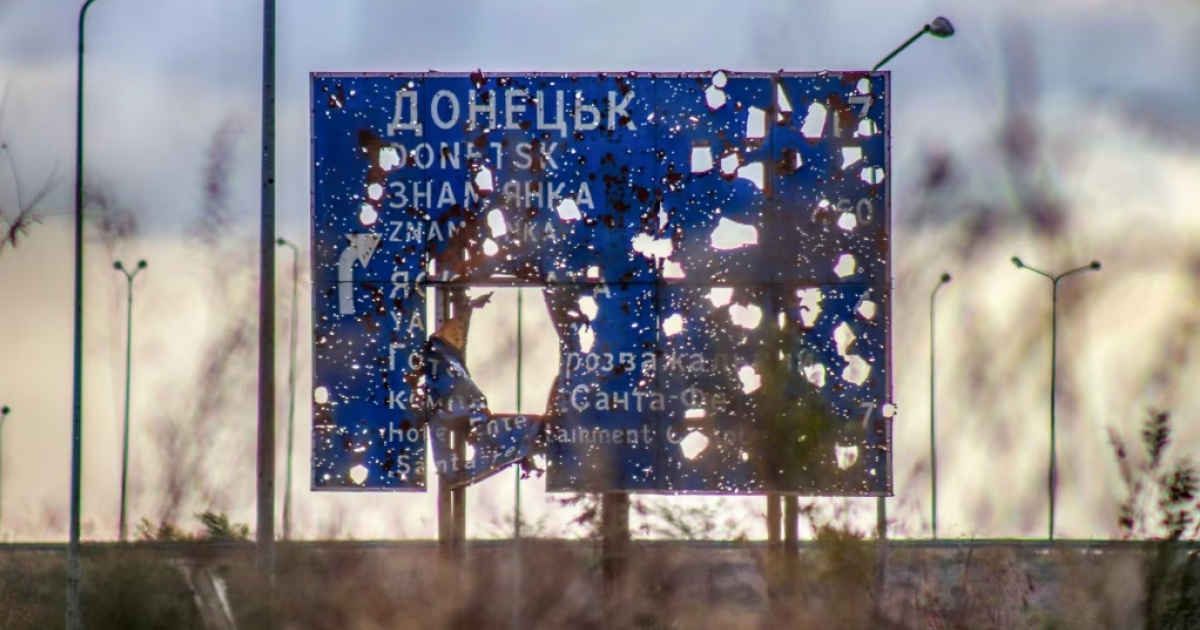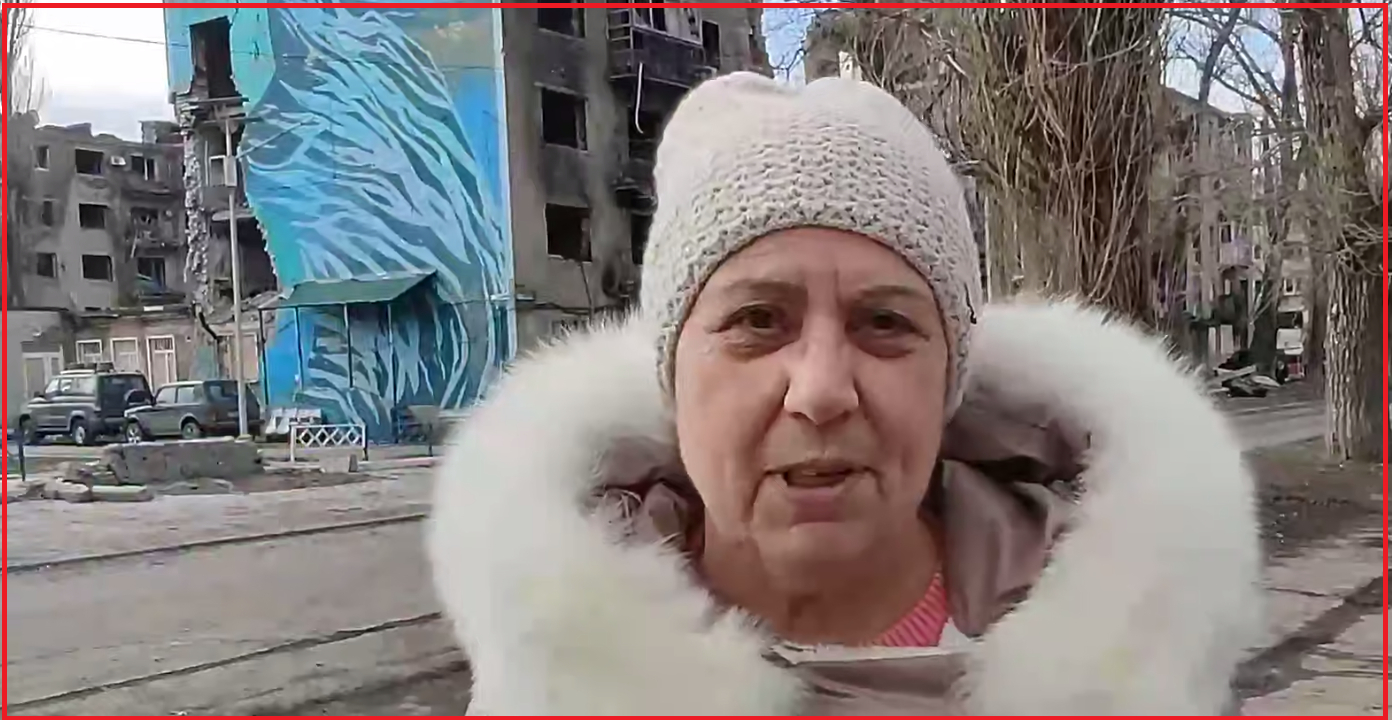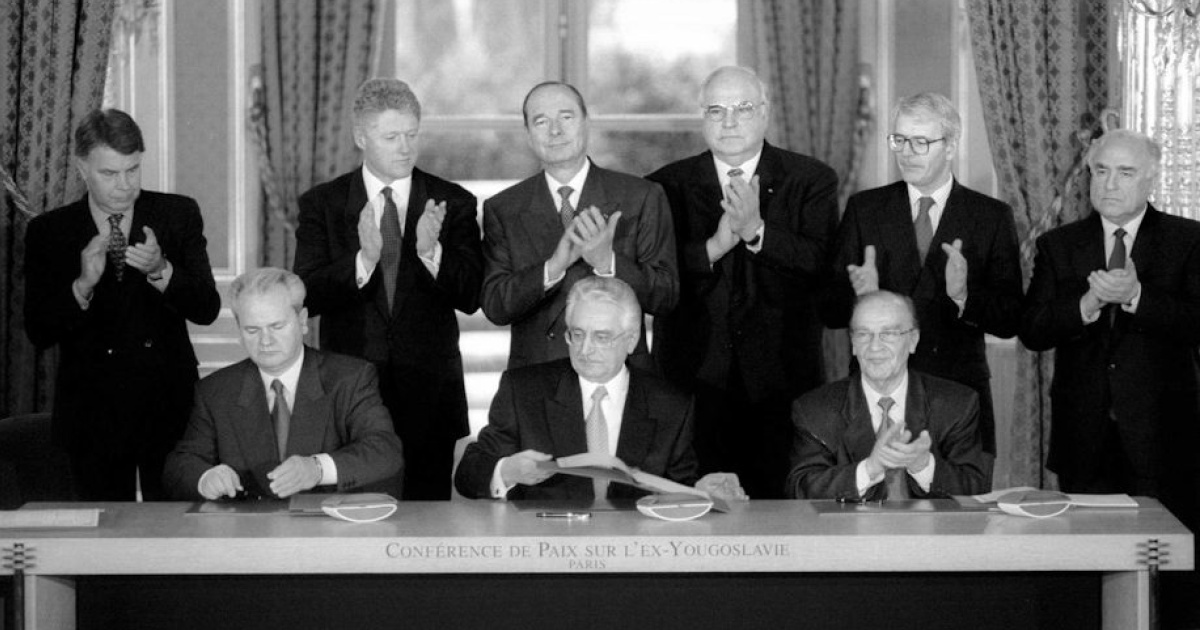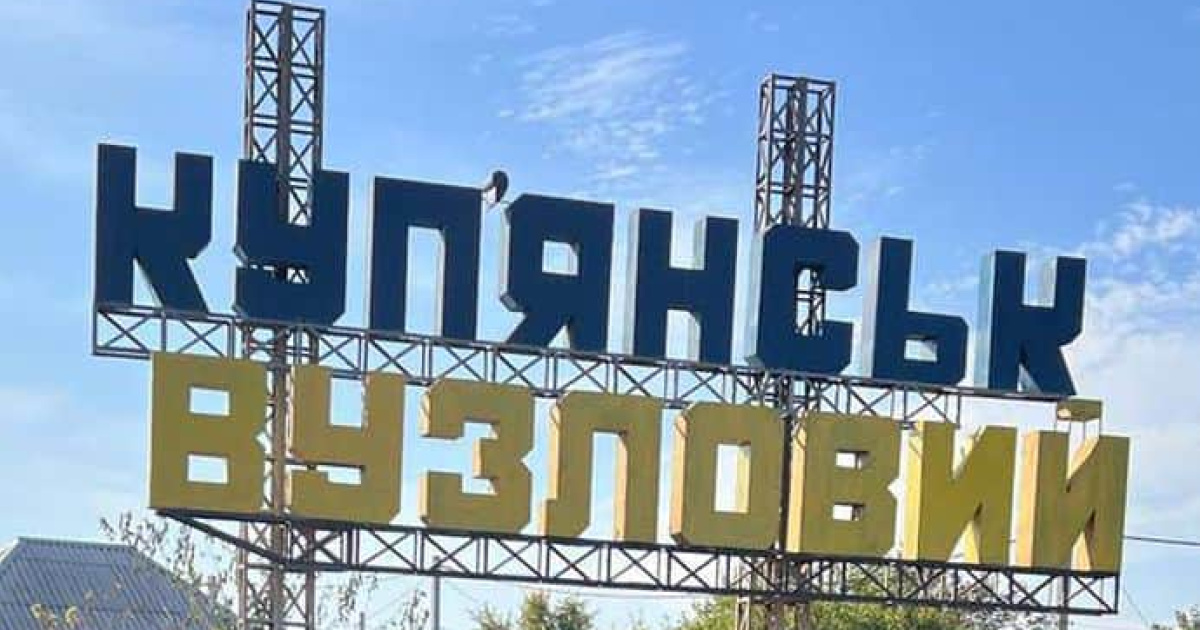Two years ago businessman Dmitriy Rudenko was forced to leave war-torn Donetsk. He left everything: the house, the graves of relatives and then his own factory. The businessman did not want to continue work in the city full of flags of another country. He decided to reboot his business beyond the occupation and he could not imagine difficulties he would face. "The current government prefers to support the business on the occupied territory," - assured Dmitriy. Nevertheless, he decided to fight.
From the intermediary to the producer
In 1997 Dmitriy Rudenko founded Ukrzheldorstroy intergrator company. It supplied materials for railway track which were produced at the Makeyevka Metallurgical Plant. The main customer was Ukrzaliznytsia.
The lion's share of these supplies was rail clamp of the rail fastening. Simply saying - the main part which holds the rails and is responsible for safety on the railway.
But cooperation with Makeyevka plant did not last long. The reason was obsolete technology.
"The technology has been used since 1930 and nobody has been able to create a new metal-cutting technology for 100 years, so that the perfect form of products is kept and therefore, it would increase the safety of the railway traffic," - he says.
After that, the businessman stopped cooperating with Makeyevka plant and decided to set up production on his own. In 2000 he rented some workshops of the factory in Dnepropetrovsk region and he got engaged in the manufacture of parts.
But he had to fight for his place in the sun. Makeyevka Metallurgical Plant did not want to surrender its leading positions. Yet Dmitriy managed to supply Ukrzaliznytsia with his products on a contractual basis.
"Ukrzaliznytsya was never interested in innovative technologies, so I had to use all possible tricks, except for one thing: I never participated in their schemes and did not pay the so-called cut. I never promoted my products due to bribes," - said the businessman.
Ukrzaliznytsia introduced a tender system for the purchase of these products that Dmitriy did not manage to win. As a result, supply and production were suspended.
In 2010 Makeyevka Metallurgical Plant began to be cut for scrap. Many workshops, including the rental of raw materials - the terminal strip, were cut. When Dmitriy got to know it, he understood that it was his chance to restore his production and enter the market again. At that moment, the businessman decided to approach the issue more seriously and create a new, unique and innovative product.
He employed a team of designers, rented a small workshop at the factory near Donetsk, installed machines and started to carry out experimental development. It took one and a half years and required investments in the amount of 320 thousand dollars.
"I worked in the factory from 8 am to 12 am and understood why nobody did anything during 100 years - it is really a very time-consuming and expensive process. Finally, I was left alone with the production. Metal specialists, with whom we started to work, left. They said nothing. It took one year and 3 to realize the drawings, only workers helped. Then there were broken fingers and hands cut by metal. But it was a mad passion. In the end, we did it. We created a completely unique product and new production," - says Dmitriy.
As a result, we started production and supply of a new product on the Ukrainian railways. Dmitriy says that about 40 thousand tons of products had been supplied to Ukrzalіznitsia since 1997 during his intermediator and production activities.


By creating his own unique production, the businessman decided to build his own new plant "from nothing" (before that the work was carried out in rented workshops). To do this, he had to take new loans to buy equipment, hire people. The factory was set up and ready to operate. The first tests for the manufacture of products were done in late February 2014.

Then everything depended on the new tender of Ukrzaliznytsia in 2014. Dmitriy was invited to Kiev where he was "asked" to pay 20% of the profits to win it. But he refused. Metinvest (Makeyevka Metallurgical Plant) won and Ukrzheldostroy plant was not even allowed to take part, they falsified documents that he had submitted.
After that infamous events started in Donetsk.
"I understood the fact that the Donetsk would hang flags of another state on February 28th, 2014 when the so-called "people's governor" of Donbass Pavel Gubarev was brought to the city council," - says the businessman.
At the beginning of March 2014 Dmitriy suggested to his employees at the plant to collect things and move from Donetsk to Kiev. He had already said that they would attempt to repeat the "Crimean scenario" in Donbass and secede from Ukraine. Therefore, the businessman decided he had no moral right to continue to work there. Only four families wanted to leave with Dmitriy (among his factory employees). The rest remained, they were afraid to move to the unknown or believed that everything would resolve quickly.
Dmitriy took only personal belongings and inventions from the plant (a unique stamp, parts and drawings). All the other equipment remained in the closed plant around which hostilities were and are carried out. Dmitriy doesn’t know how his plant is today and if something will survive after possible attacks and looters.
"I gave up as a bad job for it not to be an anchor for me. I was told that there were "guys with a Russian accent" near the factory location in mid-2015 and were interested in the manufacturing a unique product. They probably wanted to get the inventions but I managed, fortunately, to take them with me,"- he said.
"New life" after moving
The first task which Dmitriy Rudenko faced after moving to the capital was the construction of a new factory in Kiev.
But in order to develop - we needed to ensure that the products would be bought by the only monopoly consumer - Ukrainian Railways. Therefore, in May 2014 he came to the head office of Ukrzaliznytsia and declared his readiness to build a new plant near Kiev, to produce and supply the details of the strategic role. But during a meeting with the heads of Ukrzaliznytsia the businessman got a flat refusal. "We have signed a contract with Metinvest," – said they then.
It is worth noting that since the beginning of the war in Donbass, according to the terms of the tender, Ukrzaliznytsia has purchased items from Makeyevka plant which was working on the occupied territory. As it later turned out, the company was not able to fulfill the order since the outbreak of hostilities it faced limited supply of raw material and difficulties with the export of products.
Under the contract, Makeyevka plant was to supply 2.5 thousand tons in 2014, but managed to deliver only 128 tons . According to Dmitriy, because of that repairs of railways (in terms of replacing the rail clamp) were not carried out during the year. As the businessman says, the lack of repair, replacement and maintenance of the rail clamp is dangerous because of possible derailment of cars, including passenger trains.
The businessman, above all, needed assurances of cooperation with Ukrzaliznytsia to take loans for the construction of a new plant.
"The establishment of this factory would provide many forced migrants with work. I decided to hire the very people who had been evacuated from the occupied territories. And instead of the state paying money to them on allowances, people would themselves pay taxes to the state. I believe that the establishement of plant and creation of jobs must be a priority of the state," - says the businessman.
But Ukrzaliznytsia only "advised" Dmitriy to prepare for the tender for the next year, saying that they still have a valid contract with Metinvest.
"I declare that Ukrzaliznytsia did not want to conclude a contract with me not because the valid contract with Metinvest, but because they wanted to get money from us," - said the businessman.
After Dmitriy’s visit to Ukrzalіznitsia", head of department Yuzef Tuley came to his business partner (he did not know about the partnership with Rudenko) and offered him to begin production of rail clamp and promised all possible assistance. He was turned down due to technical difficulties of the new production.
Dmitriy also had a meeting with the deputy chief of Ukrzaliznytsia Vladimir Tyagulskyi who called him back the next morning with a request to show the drawings and unique equipment. Of course, he received a refusal.
D.Rudenko believes that Ukrzaliznytsia just wanted to steal his inventions and launch its own production.
Letters and appeals, meetings with ministers, speaking in the Verkhovna Rada did not give any results. The businessman believes that the income taxes at all levels, innovative technology, employment and decent wages are not among the priorities of the government.
"They flew to the US and Europe at the state’s expense for investments, which were to provide jobs, but did not want to see it under their own nose. Just for comparison - Japanese Fujikura factory which was solemnly opened personally by President Poroshenko near Lviv pays salary of $ 170 per month to its employees, while the planned level of salaries in the national Ukrzaliznychbud factory was $ 1,000," - outraged Dmitriy.
Dark tenders
The struggle continued. In 2015 D.Rudenko participated in the tender of Ukrzaliznytsia again which was scheduled on April 23rd. When Dmitriy appeared at the appointed time with a full package of documents, he was told that the tender was postponed for a few days (till April 30th). Argument of the postponing was expected - "at the request of Mekeyevska Metallurgical Plant and its management Metinvest company.
Dmitriy was very surprised that the Makeyevka Metallurgical Plant, in principle, was allowed to participate in the tender. According to him, at the time, the company was not re-registered on the Ukrainian territory and continued to work in the "DPR".
Then it turned out that the tender documents had been twice amended. In particular, the term of payment had been reduced from 75 to 5 business days at the request of Metinvest.
"I was shocked. I do not remember such payment terms for tenders for Ukrzaliznytsia even during the most prosperous years. Five days for the goods, which, as I understood, had already been manufactured at the enterprises located on the uncontrolled territory and was not re-registered in Ukraine. When I expressed my sincere surprise, the tender committee of Ukrzaliznytsia said they didn’t play political games and let the Metinvest produce wherever it wanted. As it turned out later, they do not play political games but are involved in purely practical and selfish falsification," - he says.
As a result, the tender was held. Five companies took part in it, including Metinvest (13,813,800 UAH) and new Dmitriy Rudenko’s Ukrzalіznichbud Plant (with an offer lower by 17%- 12,012,000 UAH). But the one who offered more expensive products won.
Ukrzaliznytsia paid Metinvest nearly 2 million hryvnia more than it could pay Ukrzalіznichbud.

Participants were initially assured: all previously submitted documents were valid at the time of the new date. But during the tender they simply did not accept entrepreneurs’ bank guarantees, stating that they expired. It is noteworthy that in 2 weeks after the tender there was a new paragraph in the documents: "all the documents remain valid, except for the bank guarantee." Dmitriy says that the tender committee of the Ukrzaliznytsia falsified bidding in favour of Rinat Akhmetov’s enterprise.
Disagreeing with the results of the tender, the businessman filed a complaint to the Antimonopoly Committee of Ukraine, but they only confirmed the legality of the bidding.
"It's not just about the price. I immediately had the question on the quality of products supplied by Makeyevka plant, we are talking about strategic raw material. I know that before the war the quality of products had never been high. And now imagine: military Makeyevka, people work for a loaf of bread and canned meat ... Most of the workers are not qualified. Just imagine the quality of the products. Of course, Metinvest fulfilled all the supply in full in 2015, but the products were not of appropriate quality," - he said.
Dmitriy’s words were confirmed by the investigation of the Chief Military Prosecutor of the GPOU. OstroV has a corresponding document which states that during the pre-trial investigation they found evidence of non-compliance of rail clamp with the requirements of GOST standards on the basic size, their operation and intended use.
At the end of 2015 prosecutors detained several cars that came with these parts from the uncontrolled territory. An independent examination showed that the product did not meet state standards and part of it had been already in use. Dmitriy believes that the most likely they dismantled rails for scrap, removed rail clamp and resold to Ukraine on the uncontrolled territory.
"Repair of our railways is carried out at the peril of the lives of citizens and cargo," - says Rudenko.
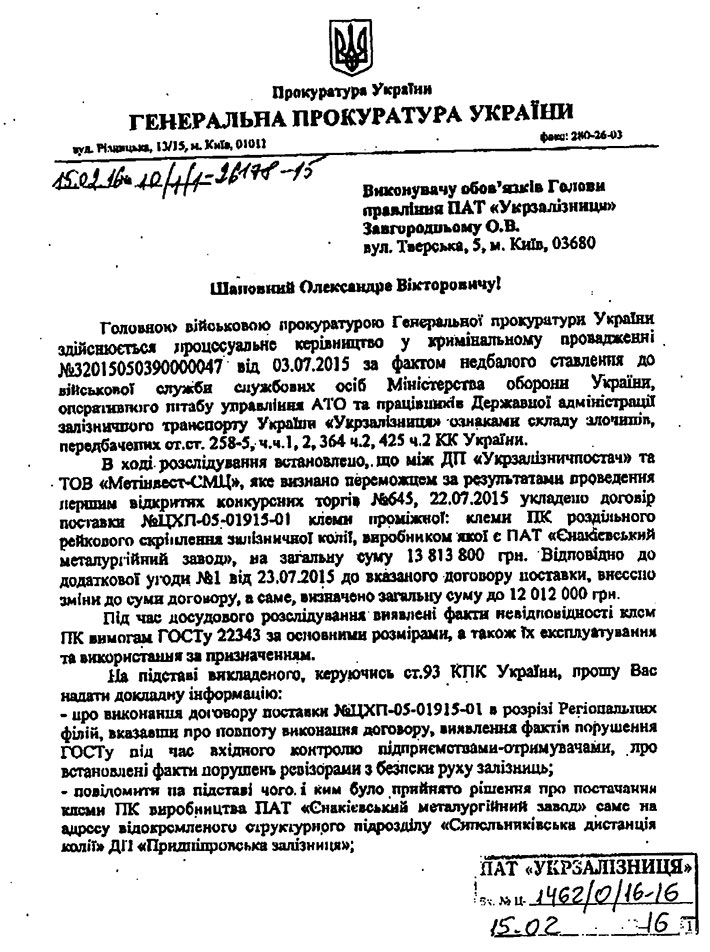
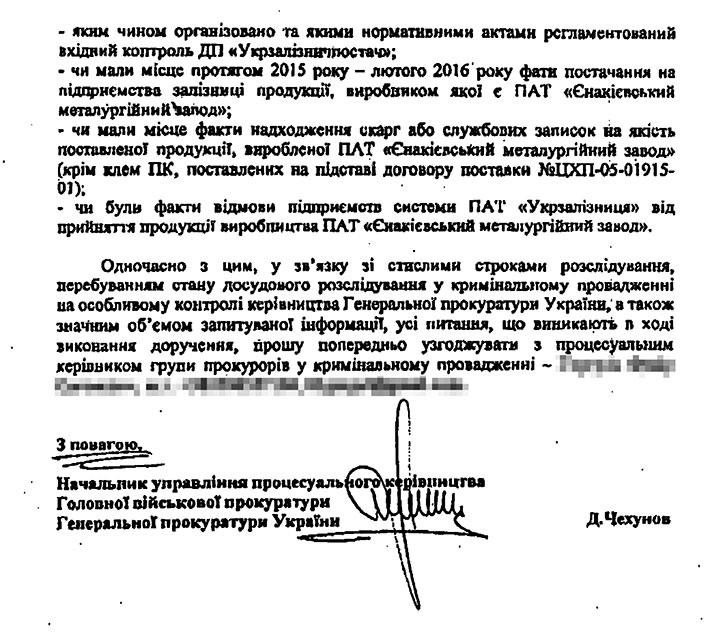
After that, several requests were sent to Ukrzaliznytsis and Infrastructure Ministry to give explanations why low-quality products at inflated prices were purchased from the uncontrolled territory. But they sent only "formal replies" that such cases were not recorded.
Dmitriy believes that Ukrzaliznytsia funds militants by purchasing products from factories that operate on the occupied territory.
"I have precise information that all businesses that operate on the occupied territories are taxed by the local so-called "governmen". Thus, we are also funding them... Employees from Donetsk call me and ask me to take them from there. I have no money and no work, I have nothing to offer them. I'll have to give them work, so that people are not dependents. But now it is not possible. It sounds funny, but I have to tell them that all the contracts are given to the plants, which are located on the occupied territory and people tell me they do not want to work for militants and help them to make money, as they see the horror of war and what is happening there," - he says.
Dmitriy addressed to the SSU, but they said they did not see the crime that enterprises which weren’t re-registered in Ukraine received payment from the state budget.
In 2016 Dmitriy Rudenko participated in the Ukrzaliznytsia tender again and faced he fact that conditions were changed at Metinvest’s requests.
Inspection must control manufacture of products of strategic role. That is, Ukrzaliznytsia experts personally come to the factory and carry out the appropriate checks. It was a requirement of the tender committee. But suddenly this point disappeared in the documents in the context of the production of rail clamp. Acting head of Ukrzaliznytsia Alexander Zavgorodniy even issued a corresponding order. There was no reply for parliamentary inquiries about the reasons for such a decision.
"Who from Ukrzaliznytsia will go to inspect the production in Makeyevka now? I understood that the tender was again adapted for Metinvest, so I decided not to participate in it. In the end, I had to pay about 100 thousand hryvnia (for registration certificates and bank guarantees) for my participation in it, but I did not consider it necessary to throw so much money to lose in advance," – decided Dmitriy.
At the moment, the results of the tender are not known.
"Now we are waiting to see which side Ukrzaliznytsia will take. On the one hand, they feel pressure from the investigation, on the other hand, they are "tied" with Metinvest. We want to see the desire of Ukrzaliznytsia to stop funding the "DPR" in one way or another and begin to develop production in Ukraine. It is a political, moral and civilizational choice. So, now I have a more expectant position," - says Dmitry.
Today Dmitriy Rudenko has not abandoned the idea of building a plant near Kiev. He received assurances from the Oshchadbnk to provide the necessary loans. The European Bank for Reconstruction and Development is ready to invest 15 million dollars in the construction of the plant.
Meanwhile it is being built, Dmitriy is ready to manufacture products in a previously rented factory in Ukraine. According to him, the potential volume of production in two lines is 30-40 tons of high-quality products per day. However, all now depends on the will of Ukrzaliznytsia.
At the same time, Dmitriy decided to unite with the Ukrainian AT Mekhanika company to produce and supply another type of fastening for railways – spring clamps. They participated in the tender with a price of 113 million hryvnia and lost to Dubnevich brothers’ Ekspositsia company with the price of 171 million. Reference: Yaroslav Dubnevich is the head of the Parliamentary Committee on Transport and his brother Bogdan is the chairman of the subcommittee on public investment projects and analysis of business management efficiency of the public sector's budget committee.
Dmitriy Rudenko believes that the tender was held with violations and falsifications. He faced changes in the competition rules again. Tender committee asked not to provide a bank guarantee (refund in case of non-fulfillment) as it has always been, but to put 4.5 million hryvnia onto the bank account of Ukrzaliznytsia. Dmitriy considered it inappropriate to freeze the money instead of production development.
At the same time, tender documents also include the condition that the warranty period of operation of the rail clamp should be not more than 3 years. The operation period of clamps provided by Ukrzalіznichbud Plant is not less than 5 years and in such a way a paradoxical and illogical barrier to participation in the tender was again created.
Dmitriy referred to the Antimonopoly Committee once again in the search for truth and justice. But they refused to consider the complaint. After that appeals to the General Prosecutor's Office, the National Anti-Corruption Bureau, a specialized anti-corruption prosecutor's office followed. Now there is an investigation.
Dmitriy Rudenko’s story is a vivid example of how the state continues to be linked with corruption, despite the war. Instead of contributing to the development of the national economy, it continues to support businesses on the occupied territories, which, although unofficially, but pay taxes to the "DPR" and "LPR". Ukraine creates jobs in the occupation, but does not create them on the controlled territories ...
The businessman decided to not give up and continues to fight.
"At first, it might seem that we face only a dead end, the prospects for the creation and development of industrial assets are blocked. But this is not the case. Our team takes it as participation in the war which is taking place in the external and internal fronts. The fierce resistance of the system, which refuses to change, actually proves residents of the occupied territories that they don’t need to long for Ukraine and restore the integrity of the state. Corruption, which flourished in Kyiv, is a challenge for us which we responded and we are going to reach our goals. We will break this vicious circle and our victory will be part of the victory of new Ukraine," - says Dmitriy.
Vladislav Bulatchik, OstroV

